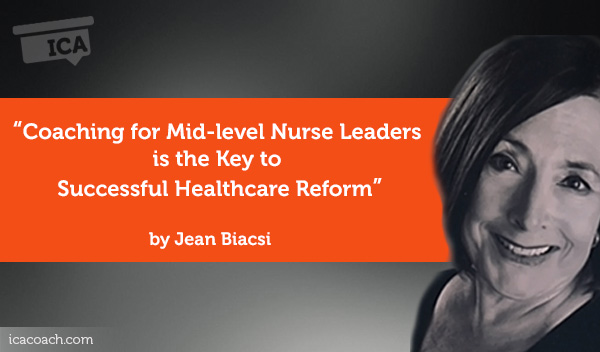
Research Paper By Jean Biacsi
(Life Coach, UNITED STATES)
Coaching done well may be the most effective intervention designed for human performance. Atul Gawande M. D.
ABSTRACT
The purpose of this research paper is to provide the reader with the evidence that the provision of coaching for the mid-level leader, specifically as it pertains to nurse leaders will lead to positive results. The healthcare industry is undergoing an enormous transition with the catalyst of this change being health care reform. Research indicates that nurse leaders will play a pivotal role in the success of the industry’s transformation. The profession’s leaders recognize the gaps in the nurse leaders’ educational preparation and have cited coaching as a key component of any plan to support and prepare nurse leaders to take on the expanding roles demanded by reform. The industry has historically functioned on very narrow margins and with the onset of “pay for performance” the margins will be further reduced. The result is limited financial resources. Under this scenario the executives in the industry require solid evidence that the investments that are made will provide a substantial enough return to justify the use of the scarce financial resources. The power of coaching to improve performance at one of the most critical and influential levels of the organization is supported by the professions leaders.
Introduction
There has not been a period in the healthcare industry history where the need to have all leaders, at every level of the organization, prepared and ready to expand their individual roles and play key roles in the successful transformation of the industry as there is now. Unfortunately, many leaders, and particularly nurse leaders, have not been educationally prepared or supported to confront these massive changes.
Many articles have been written by leaders within the profession, and outside of the profession, as well as multiple studies that include coaching as a key component of any plan for successful reform. Research has supported the value of coaching to transform behaviors that lead to markedly improved performance which then results in improved quality and significant financial success. Yet with all this data that suggests the profound value of coaching, skepticism persists. Given the limited financial resources being experienced by the industry in its entirety, the imperative to be able to demonstrate a quantifiable return on any investment has never been greater.
This paper will focus on the drivers behind the current state of the industry; the implications for mid-level nurse leaders; retention vs. turnover; strategies to address the challenges ahead; the business case for investing in coaching for nurse leaders and techniques to measure and demonstrate quantifiable return on investment data.
State Of THe Heathcare Industry
The Patient Protection and Affordable Care Act
(ACA) was passed by Congress in 2009 in response to alarming increases in healthcare costs; the lack of health insurance coverage and access to care for millions; and the declining quality of clinical care. The healthcare system, as a whole, is severely broken and incentives are upside-down. In truth, the industry is not about healthcare but all about “sick care”. Revenues for all levels of providers of care are based entirely on the provision of care and services rather than on prevention. The transformation that is necessary is both broad and deep and riddled with controversy from within the industry and outside.
In a recent Gallup Survey titled,
Nursing Leadership from Bedside to Boardroom
it states,
Nursing will be at the center of this reform…Nurses must learn to consider both patient and the health system while working on a team and being a better team player.
Not every player in the industry is pleased to read about the potential role enhancement that this monumental change may bring. As with most change, there will be resistance, not just from physicians who are concerned that the role expansion will be carved out of the physicians current scope of practice but also from patients and, not surprisingly, from the nurses themselves.
Implications For Mid-Level Nurse Leaders
The expansion of the nurse role, which is such a critical component to the success of health care reform, will require the nurse leader to become knowledgeable about business; finance; personnel management; career development and staff support while managing the clinical environment that the leader oversees. Many of the aforementioned functions were not taught during the nurse leader’s academic educational preparation. In addition there will be many new roles that have not yet been designed but will include the necessity of skills and competencies that few nurses possess. Key to the organizations success will be the ability of the nurse leader to recognize how their decisions, at the department level, impact the entire organization.
Unfortunately, nurses are not being included in the design of healthcare reform. A study done by Gallup and funded by the Robert Wood Johnson Foundation, identified why that was the case. There is currently
no structure in place for people to listen to what nurses have to say.
Not only are nurses not prepared to seize the opportunities on the horizon but there aren’t enough well-educated and prepared nurses to fill the roles we currently have open. The Institute of Medicine recommends that the nursing profession increase the number of Baccalaureate prepared nurses (BSN) to 80% from the current 50% by the 2020. In a recent NURSE.com article titled,
Vacancy-Who’s the Boss? Why nurses are reluctant to fill or stay in Management Positions
the author quotes the results of a recent survey of 1000 nurses. Of the 1000, fully 50% plan to retire within 8 years. There will be seasoned, experienced nurse leaders in those numbers and formal succession planning at that level, is virtually non-existent. Nurse leaders note that the support and encouragement of a mentor/coach is one of the major factors in their seeking a management position.